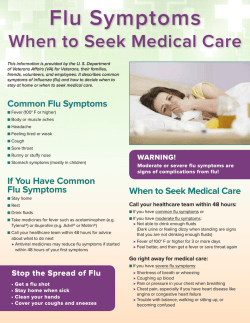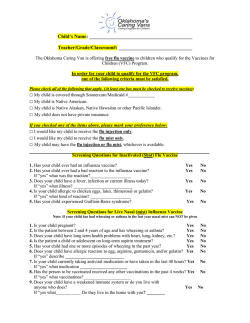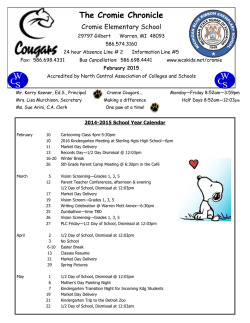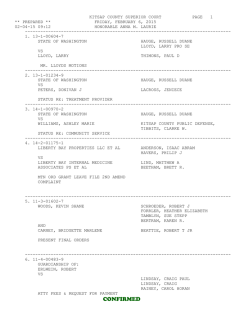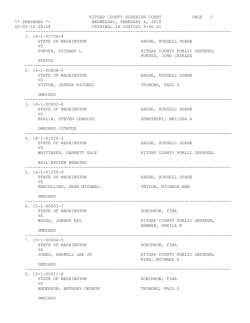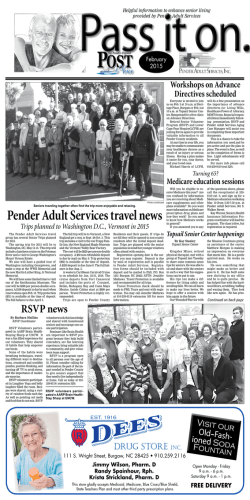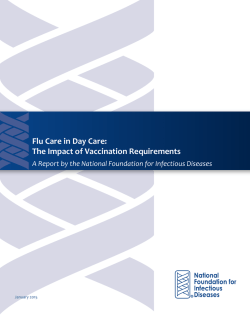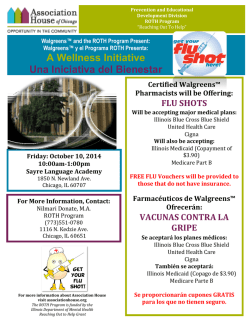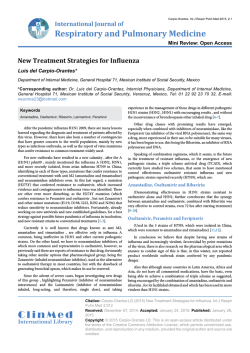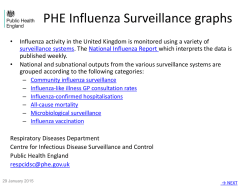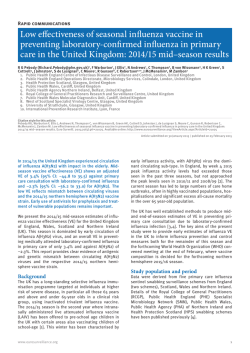
Kitsap County Sees Fifth Influenza
MEDIA RELEASE FOR IMMEDIATE RELEASE January 27, 2015 Kitsap County Sees Fifth Influenza‐Related Death This Flu Season It is not too late to get the flu shot BREMERTON, WA— Kitsap County has had five influenza‐related deaths this flu season and the Kitsap Public Health District is urging the public to get vaccinated and take personal hygiene measures to protect themselves and others from the flu. “These deaths are a reminder that the flu can be a severe illness, especially for those at risk for complications,” said Dr. Susan Turner, Health Officer for Kitsap Public Health. “The best way to avoid the flu and other respiratory illnesses is to get vaccinated, wash hands often, cover coughs, and stay home when sick,” Dr. Turner added. Kitsap Public Health is monitoring absenteeism reports from schools throughout the county, information from physicians and hospitals, and statewide influenza data which all indicate widespread influenza activity—as well as increased respiratory syncytial virus (RSV) and pertussis activity. People who are at high risk of influenza complications include adults 65 and over, young children, pregnant women, and people with certain chronic medical conditions. Anyone in these categories should seek vaccination, and visit their physician right away if they develop flu symptoms. Four of the deaths in Kitsap County have been adults over age 70, and the fifth was an adult over age 50 with underlying medical conditions. What people can do to protect themselves and their families: Get vaccinated. Wash hands often; clean hands after coughing or sneezing. If sick and at risk of complications from the flu, see a physician right away. Cover coughs and sneezes with elbow or tissue. Stay at home if sick, and if asked, wear a mask. If a cough lasts longer than a few days, see a healthcare professional. ‐continued‐ Page 1 of 2 kitsappublichealth.org Kitsap County Sees Fifth Influenza‐Related Death This Flu Season continued Influenza affects people of all ages and can cause severe illness or make existing health conditions worse, resulting in hospitalization and death. Flu symptoms include fever, headache, tiredness, dry cough, sore throat, nasal congestion and/or muscle aches. Complications of flu can include bacterial pneumonia, ear infections, sinus infections, dehydration, and worsening of chronic medical conditions, such as congestive heart failure, asthma, or diabetes. Anyone with an increased risk for complications that develops flu symptoms should contact their physician or clinic right away. Antiviral medications help, but they must be prescribed by a doctor and are most effective when started within 48 hours of illness onset. The Centers for Disease Control and Prevention (CDC) recommends that everyone six months and older get vaccinated for influenza. It takes about two weeks for the vaccine to fully protect against the flu. Some children under age nine may need two doses of flu vaccine. According to the Washington State Department of Health, Influenza A (H3N2) viruses are most common so far this season. While the H3N2 viruses have changed slightly from the strain that’s included in this year’s flu vaccine, the vaccine still offers protection against the well‐matched strains, provides some protection against the changed strain, and can help prevent serious flu complications. There are two types of flu vaccines – a shot and nasal spray. Flu vaccines are offered at many doctors’ offices, pharmacies, and even through some employers. The Flu Vaccine Finder (http://flushot.healthmap.org) and the Family Health Hotline at 1‐800‐322‐2588 can help people find locations offering flu shots that are convenient for them. Kitsap Public Health provides low‐cost flu shots for children under age 19. No one is turned away due to inability to pay. Kitsap County residents can call Kitsap Public Health at 360‐337‐5235 for information or to schedule an appointment. For more information on influenza, visit www.kitsappublichealth.org. ### For more information, please contact: Karen McKay Bevers Public Information Officer 360‐307‐4252 ‐ office 206‐718‐3661 ‐ mobile [email protected] Page 2 of 2 kitsappublichealth.org
© Copyright 2026
